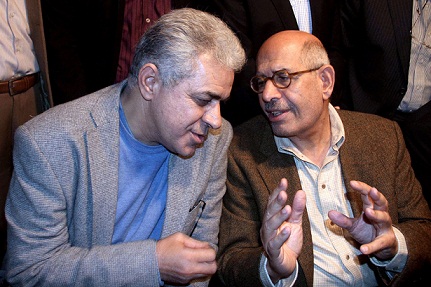CAIRO: Residents of Zerzara, a slum in Port Said, were caught off guard as bulldozers began to destroy 15 houses in the neighborhood on May 4.
Without prior notice, the governor of Port Said ordered the eviction of the informal settlements infringing the widening of a road that should provide better access to modern buildings surrounding the area.
“So far 15 houses have been destroyed, but we estimate that another 200 houses are at risk,” Manal El-Tibe, director of the Egyptian Center for Housing Rights (ECHR), told Daily News Egypt.
According to the ECHR, police forces escorting the bulldozers were violent towards protesting residents. “We were also prevented from taking photos,” El-Tibe adds.
The families already evicted were offered LE 500 in compensation for the loss of their homes and allowed to rebuild their homes away from the road, according to a report by Amnesty International.
"Even if the authorities are genuinely building a road for the benefit of the community, nothing can justify the fact that families were thrown out of their houses without being given anywhere to go," Hassiba Hadj Sahraoui, deputy director of the Middle East and North Africa Program at Amnesty International, said.
Last week, Amnesty International called on the Egyptian authorities to halt the forced eviction of 200 families in Port Said.
“It is the second time these people have been evicted from their houses,” El Tibe explained. Most of the Zerzara residents have constructed their houses in 2000 after they were evicted from rundown housing in Al-Salam and Nasser areas, two other slums in Port Said, without being offered alternative housing.
“They treated them like trash,” El-Tibe adds. “Zerzara was a dam area before. Now, there is no sanitation, no water, no electricity – nothing.”
As a consequence of the accumulation of rubbish and sewerage water on the land, the around 6000 families living in Zerzara are susceptible to a host of dangerous diseases.
“The ECHR immediately filed a complaint with the Public Prosecutor in order to stop the demolition process and to open an investigation. But the attorney general has to invite the victims and us to hear the complaint. But until now there was no response,” El Tibe said.
“I don’t think there will be a reply,” she said.
In 2009, Zerzara residents protested because of their lamentable housing conditions. The governorate responded with the promise to build 9,000 housing units for Port Said’s slum residents, of which 3,000 should be allocated to families of Zerzara.
According to Khaled Mahmoud Abbas from the Ministry of Housing, six months ago the governorate started the construction of low income housing units.
“This week, the governorate will announce in the Port Said Stadium which families will receive an apartment, which apartment they will get and when they can move in,” he told Daily News Egypt.
“This project is part of the National Housing Program aimed at creating 500, 000 low income housing units in six years. The program will end October 2011,” Abbas explains.
In 2007, according to the Ministry of State for Local Development, 12 million people lived in 870 informal settlements in Egypt – informal statistics estimate that there are around 16 million.
In October 2008, the Informal Settlement Development Fund (ISDF) was created to develop strategies in order to deal with the slum phenomenon in Egypt.
Until now, the ISDF identified 440 risk areas – Zerzara was classified as a second degree unsafe area – and started 30 pilot projects. “The aim is basically to remove the slums and to resettle the residents to more adequate housing units,” Abbas said.
El-Tibe sees two problems in the ISDF’s strategy: “The ISDF declared clearly that it will not engage in a consultation process with the civil society, NGOs and the local powers. But without consultation, they will not go in the right direction.”
“Also, they don’t have the financing – there are 440 risk areas and they have only LE 500 million per year.”
“They can finance it only if they remove the informal settlements that are on profitable land and sell the land. But I fear that they there will be a prioritization of risk areas, favoring the ones that are on profitable land. Even worse, they could declare areas as risk areas even if they are not, only because they want to sell the land.”
In Egypt, offer and demand in the housing sector are diverging. “The government invests in more luxurious housing and considers that ‘low income families’ can afford paying LE 600 per month for housing alone. This does not correspond to reality,” El-Tibe said.
This leads to a notable number of empty housing units. “In 2006, the national census showed that 5.8 million housing units have never been rented or sold,” El-Tibe told Daily News Egypt.
“The government cannot build houses for everybody; there is no budget for it. But instead of destroying the informal settlements, why not let the people build their own houses and provide them with the facilities?” she said.


